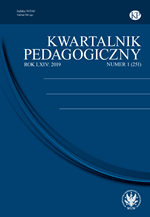Dialogue-based school practices as a means of reducing conceptual fossilisation in language learning
Dialogue-based school practices as a means of reducing conceptual fossilisation in language learning
Author(s): Michał Daszkiewicz, Laura KerslakeSubject(s): Social Sciences, Language studies, Language and Literature Studies, Education
Published by: Wydawnictwa Uniwersytetu Warszawskiego
Keywords: dialogic education; dialogism; fossilisation; interlanguage; shared construction of meanings
Summary/Abstract: In language studies, fossilization is associated with the formation of permanent intermediate systems and subsystems. The interlanguage that develops between L1 and L2 (Selinker 1972) becomes embedded, rather than the learner continuing to develop increasing proficiency in the L2. As a language learner remains deficient in the target language (TL), it is important to attempt to mitigate this process and its negative effects. From this perspective, a task of the language teacher is to identify pedagogies which can prevent students from becoming lexically entrenched. In this paper, we advocate dialogic pedagogy as one which can reduce the likelihood of fossilisation occurring and which emphasises collaboration between learners, making their learning experiences meaningful. A core element of dialogic teaching and learning is the role of talk in the classroom in stimulating and advancing students’ learning and understanding. We propose that prioritising the oral component of language learning through dialogic pedagogy can reduce fossilisation because misconceptions do not remain unchallenged and become ingrained. A culture of dialogue in which the voices of all learners and teachers are heard and responded to is one in which learners’ exchanges contribute to extended understanding for all of those taking part in the dialogue.
Journal: Kwartalnik Pedagogiczny
- Issue Year: 251/2019
- Issue No: 1
- Page Range: 183-194
- Page Count: 12
- Language: English
- Content File-PDF

